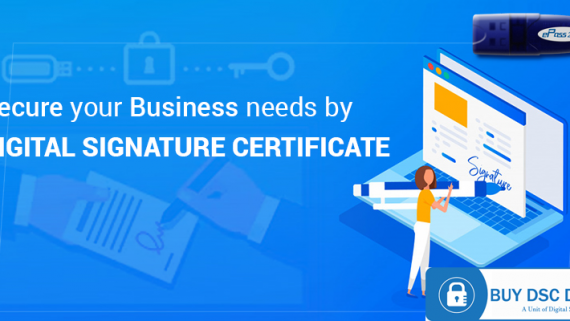How it works & Benefits of Digital Signature Certificate
A digital signature is a mathematical scheme for demonstrating the authenticity of digital messages or documents.
While digital signatures have caught the fancy of many corporate and executives, what exactly is it? Simply put, a digital signature is your electronic fingerprint. It lets you sign a document electronically and it validates the signer. It is a mathematical code that authenticates the document from the sender and ensures the document remains unaltered on reaching the recipient.
Fears about the security of digital signatures are reasonable, however, it uses an accepted format called a Public Key Infrastructure, which provides a very high level of security making it difficult to duplicate. Digital signatures make office paperwork far more efficient, but laws regarding this technology vary between countries.
The benefits of digital signatures have more offices and companies getting on the bandwagon in favour of Digital Signature Mart, making for a far more efficient and secure workplace, digitally.
Advantages of digital signatures.
- Saves Time: – You no longer have to wait for your manager to return from a holiday or conference for that signature. Digital signatures ensure that businesses save on cost and time with documents and contracts signed off with a click of a button. There are huge savings in cost and time especially when the person required to sign is in a geographically different area. Documents can be signed off almost instantly, from anywhere. Be it a tablet, phone or computer, digital signatures can seamlessly ensure this otherwise tedious task is wrapped up in minutes.
- Cost Savings: – Many companies also see significant cost savings, with little or no expense in ink, paper, printing, scanning, shipping/delivery or travel expenses. There are also savings in other indirect costs such as filing, rekeying data, archiving, or tracking.
- Workflow Efficiency: – With lesser delays, digital signatures ensure better efficiency in workflow. Managing and tracking documents are made easier, with lesser effort and time involved. Many features of the digital signatures help speed up the work process. For instance, email notifications help remind the person to sign, while status tracking, helps to know at which stage the document is at.
- Better Customer Experience: – Digital signatures provide the convenience of signing important documents were ever a customer or the person to sign is located. Salespersons do not have to wait for the customer to come to the bank or office. Documents can be signed off at the doorstep. This is ideal, especially in remote areas and smaller townships providing improved and personalized services. The customer has the freedom to be anywhere, and engage with a company, making services and businesses far more easy, quick and user-friendly.
- Security: – When it comes to signatures, authenticity and security is a priority. Digital signatures reduce the risk of duplication or alteration of the document itself. Digital signatures ensure that signatures are verified, authentic and legitimate. Signers are provided with PINs, password and codes that can authenticate and verify their identity and approve their signatures. Time stamping provides the date and time of the signature and thus provides a track of the document, minimising any risk of tampering or fraud. Security features embedded in digital signatures ensure that documents have not been altered without authorization.
- Legal Validity: – Digital signatures provide authenticity and ensure that the signature is verified. This can stand in any court of law like any other signed paper document. Time stamping and the ability to track and easily archive documents improve and simplify audit and compliance.
- Future Validity: – Digital signatures also hold validity in the future. ETSI PDF Advanced Signatures (PAdES) with its eIDAS requirements have validity well into the future with its long term signature formats. Should there be far-reaching technological changes, digital signatures would still be valid for the foreseeable future.
- Environmental Benefits: – As corporate and business become more conscious of their role in sustainability, digital signatures are a step ahead in their efforts in reducing waste and being environmentally friendly.
- Business efficiency: – The costs involved in integrating digital signatures into the work processes are relatively small, compared to their benefits. With quicker contract turnaround time, and reduced the workflow time, digital signatures are ideal for both small and large organizations.









Comments
No comment yet.